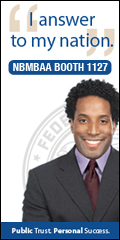
"We Wear the Mask": The Power of Self-Awareness, Authenticity, and Resilience in Your Career and Life"
By Antonya English
When Atira Charles arrived at Arizona State University in 2004, she knew exactly what she wanted to focus on during her doctoral studies.
In 2004, Charles became the first black woman to enter the organizational behavior management PhD program at Arizona State, but she had to fight to convince others to believe in what she was focused on. Dr. Charles presented a session Thursday morning at the National Black MBA Association’s annual conference entitled "We Wear the Mask": The Power of Self-Awareness, Authenticity, and Resilience in Your Career and Life" that engaged, encouraged and challenged those in attendance to become more self-aware and be true to themselves. "When I arrived (at Arizona State) they said ‘What are you interested in studying?’," Charles recalled. "I said race, gender and identity in the workforce." When her advisor tried to steer her in a different direction, Charles refused. "I said, listen here, I’m not coming in here just to be called doctor for the rest of my life," Charles said. "I’m coming in here to explore an issue that I know is existent in my community, and other communities related to this, and there’s no way I’m engaging in a five-year Ph.D. process and not doing something that will impact and benefit the professional people of color in the universe. That was just my personal decision." One day, she took her advisor a poem she wanted her to read, asking her to "internalize and feel the words." The poem was Paul Laurence Dunbar’s "We Wear The Mask." It reads: "We wear the mask that grins and lies,
It hides our cheeks and shades our eyes,
This debt we pay to human guile;
With torn and bleeding hearts we smile,
And mouth with myriad subtleties.
Why should the world be over-wise,
In counting all our tears and sighs?
Nay, let them only see us, while
We wear the mask.
With that, Dr. Charles captivated the packed meeting room at the Orange County Convention Center. During her nearly 90-minute presentation, Charles, now an assistant professor at Florida A&M University, kept the audience members engaged, and allowed opportunities for activities that required participants to seriously reflect inward. Throughout her presentation, Charles took questions from seminar participants which allowed them to feel fully engaged during the talk. Charles specializes in studies on how organizations can effectively manage the differences of their employees through social and structural means. She strives to help clients work to impact cognitive processes of their employees in order to promote psychological and behavioral changes in individuals. Charles opened by asking the audience to do something most people don’t typically do on a regular basis: "reflect inward." "So many days we wake up and we just get into the rat race of life and we just kind of keep on moving," Charles said. What gets lost in the daily routine is that "we don’t take the time to reflect about who we are," Charles said. "And the world spends the whole day watching us and telling us who we are, but we don’t spend the time to do that for ourselves." Charles said she wanted the audience to accept and operate under one general principle "Understanding ourselves matters," she said. "That’s a general thesis that we have to accept is true." A mother of three children under the age of eight, Dr. Charles received her B.S. in finance and master’s degree in Business Administration from Florida A&M University. She said it’s important to be self-aware enough to be authentic, yet allow ourselves to be open enough so that others can also get to know and feel more comfortable with us in the workplace. "Sometimes we get into work and get into a Safari Hunt space where we’re just trying to stay alive," Charles said.
She added: "What research shows is the management of our identity is always top of the line," she said. "The problem is if you’re not aware of it, not managing it and not controlling it, then it can take control."
One session participant told Charles he "wears the mask" at work to attempt to make the majority of his colleagues feel more comfortable around him, so that he can be successful. He said to be successful, he had to mask his true identity. But Charles reminded him that "a mask is a performance," and "being on the stage (constantly) is taxing." "It’s just a lot to always be on stage," Charles said. When Charles asked audience members for metaphors for "Wearing the Mask," their responses included:
Charles’ response to the latter: "What happens when a bulb is always on? It burns out." One way to address establishing a true identity is to realize it can be more than one thing at the same time, Charles said. Charles said if there are identities among individuals that conflict with each other, it’s important to understand that, then find ways to handle the identity conflict. "No identity feels good every day, all day, all the time," Charles said. "Identity is not singular. You have to be aware of the two sides" Charles told the group the only thing each has full control over is themselves. "You can handle you," she said. "You must start to recognize the identities you have as tools and skills to be able to do what you want to do." She added: "A lot of us aren’t giving it a shot." In and "Identity Reflection Exercise", Charles asked session participants to make a list of two professional and two personal identities most important in life, then asked what the benefits and negative consequences are for both groups. Participants said the exercise was extremely challenging. As an example of recognizing and balancing two identities, Charles said she’s not a football fan, but has committed to watching one football game per week with her husband, a college professor who is an avid football fan. It gives them more time together and she is able to participate in something that matters to him. When asked if that made her less authentic to her true self, Charles responded said no. "I made a choice that the alignment (of identities with her husband) matters more," she said. Understanding psychological mechanisims is also critical. When under stress, anxiety, and ambiguity it’s impossible to perform at maximum level. For people of color, Charles said, the challenge is even greater. "In corporate space, the higher up you go, there is less representation of people of color and women in leadership positions," Charles said. Individuals with "stigmatized identities" have two identities to manage at work: the professional identity and the stigmatized identity. As part of the identity management solutions, Charles said individuals must:
Ultimately, Charles said, there is an end goal to identity management in personal and professional life. Those goals are:
"Wellness is the true end goal," she said. "None of those others matter if you’re not well."
Most of all, Charles said don’t be fooled into thinking it’s possible to completely separate personal and professional lives. "I challenge you to think about how some of these things are connected to your professional life," she said. "We’ve been taught a narrative that I think is false: the workplace is no space for emotion, keep those things separate. Guess what? We’re not splitting you in half in the morning. So the self that is at home that’s down and out and crying, guess what, that’s the self that’s going to work. So the whole idea that it’s separate, make sure you don’t find yourself connected to that." Dr. Atira Charles can be reached at dratiracharles@gmail.com. For more information on the subject, go to www.ourmasks.com. Follow her on Twitter at @DrAtiraCharles. |
National Black MBA Association, Inc. ® | 400 W. Peachtree St. NW, Suite 203 | Atlanta, GA 30308 www.nbmbaa.org |



